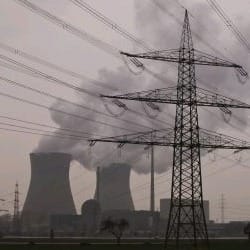The Electricity Policy Research Group explores the implications of the Japanese earthquake on European energy markets and policy
In a new Cambridge Judge Business School podcast, researchers from the Electricity Policy Research Group (EPRG) at Cambridge Judge Business School explore the implications of the Japanese earthquake on European energy markets and policy.
The EPRG’s Dr William Nuttall, Dr Michael Pollitt, Dr David Reiner and Dr Pierre Noël discuss European energy policy in the post-Japan earthquake era, examining the impact on nuclear policy, energy markets and climate policy in the short and longer term.
Dr William Nuttall, Assistant Director of EPRG at Cambridge Judge Business School, said that we need to learn lessons from Fukushima, but we must not overreact in terms of discarding nuclear energy as an option for our energy futures. He says it is ‘fear’ itself that we have to ‘fear’:
“The importance of the issue comes from the fear rather than the danger, but the need now is to learn lessons as we did from Three Mile Island, which was caused by a very small technical fault, and it had significant consequences although it didn’t kill anybody. Chernobyl did kill people 31 around the event and it’s believed several thousand over the following years. This was an accident driven by the human error of the operators building upon poor design, but there was no technical malfunction of the plant on the day. There were issues of a lack of reactor containment and it had a real physical hazard associated with it as well as the pervasive issue of fear.
“Fukushima is more like the Three Mile Island accident in 1979; the plants there were designed before those at Three Mile Island. The lesson I am taking away is the importance of containment in ‘loss of coolant’ accidents; these are issues which are well considered by those building new plants in the UK now.”
Dr Michael Pollitt, Assistant Director of EPRG, said that as Tepco (Tokyo Electric Power Company) battles to decommission its four damaged reactors at Fukushima, the world watches to see how global energy prices will respond, particularly the demand for oil, gas and renewables. Dr Pollitt says liberalising the power market and reducing the demand for energy should become even more important post-Japan:
“The structure of the Japanese nuclear industry is based on regional monopolies which supply their own customers in their own areas with limited interaction between the rest of Japan. Japan itself is split into two grids, which are only weakly connected. You can’t get much electricity from the West into the East where Tokyo is. This is a result of not liberalising the market as much as we have done in the UK and Europe.
“I think what we can observe is that it is impossible to predict what will happen in energy markets. This is why they need to be as global as possible to provide the sort of energy security that Japan now requires. I would venture one prediction and that is that it will cause a redoubling of our efforts on demand-side management and demand reduction, which both reduce our energy requirements and our carbon emissions. If our technical options become more restricted on the supply side, it pushes us back to demand side interventions.”
Dr David Reiner, Assistant Director of EPRG, said that the Japanese crisis and its impact on support for nuclear power had implications for European and international climate policy. Reducing CO2 emissions and meeting climate change targets are claimed to be a priority, but the current crises in both the Middle East and in Japan demonstrate that climate change clearly has not risen to the same level of importance:
“After Chernobyl, public opinion rebounded remarkably quickly to where it was prior to the disaster. It is more than just a question of whether the public is supportive or opposed to nuclear power. We know the focus of attention will eventually move onto other issues, like climate change, but that doesn’t mean that many policies at the moment, like the Energy Market Review in the UK, won’t be affected.
“This is the challenge. We are going to see politicians being quite sensitive to public opinion. We could easily replace nuclear with new fossil-fired generation capacity but that destroys our efforts to deal with climate change targets. The real issue is not that we can’t overcome problems with nuclear power but whether that is compatible with our other environmental objectives.”
Dr Pierre Noël, Senior Research Associate and Director of EPRG’s Energy Policy Forum, said that consumers may regard nuclear as part of ‘old energy’, while ‘new energy’ is associated with renewable sources such as solar and wind. However, investing in renewables requires huge subsidies:
“Many people think that nuclear is a thing of the past. Even in a country like France there are a growing minority of people, who have considerable political leverage on the mainstream parties, who do not favour continued investment in nuclear power.
“Renewable energy is very, very expensive and almost certainly the Fukushima disaster will translate into even more subsidies for renewables, but the taxpayer’s willingness to pay those subsidies is unknown.”


